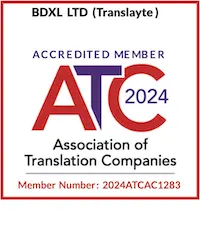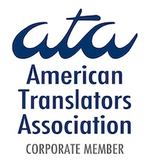Sworn Translation Requirements in Poland?
In navigating the landscape of document translations in Poland, it's crucial to understand the country's requirements. Poland acknowledges ‘professional’ or 'sworn' translations, depending on the purpose of the translation. Professional translations are usually required when translating business, legal, medical, or other industry-specific documents, while sworn translations are used for official or legal purposes.
Sworn translations are performed by professionals who have undertaken the rigorous state examination and have been authorized by the Polish Ministry of Justice. They are typically required for official documents, such as birth certificates, marriage certificates, academic records, and legal documents.
According to Polish law, a sworn translator is a recognized official, therefore, the process of obtaining their qualification is regulated in the Act of November 25, 2004, on the profession of a sworn translator – Ustawa z dnia 25 listopada 2004 r. o zawodzie tłumacza przysięgłego (Art. 2 point 1.).
To be considered a sworn translator in Poland, there are some prerequisites:
- You must have good knowledge of the Polish language.
- You must have the full legal capacity to become a sworn translator.
- You must have no criminal record.
- You must have a master’s degree in philology or postgraduate studies in translation in a selected language.
- You must be a Polish citizen or have citizenship in one of the EU or EFTA countries.
Once you meet all these conditions, you must pass the state public exam by the Ministry of Justice to become a sworn translator who can operate legally in Poland.
Where are Sworn Polish Translations Required?
Sworn Polish translations are required in various legal and official contexts where the accuracy and authenticity of translated documents are crucial. Specific government bodies and public institutions in Poland that often require sworn translations include:
- Courts: Any foreign legal documents submitted in Polish courts, including civil, criminal, and administrative cases, often require translation by a sworn translator to ensure the documents are legally recognized and valid for proceedings.
- Public Prosecutors' Offices: Similar to court requirements, documents presented as part of prosecutorial investigations originating from non-Polish sources need to be translated by sworn translators.
- Ministry of Justice
- Police and Law Enforcement Agencies
- Registry Offices (Civil Status Offices): For matters related to civil status such as births, marriages, or deaths involving foreign documents.
- Prefectures and Local Government Offices: They may require sworn translations for various administrative procedures involving foreign nationals or Polish citizens with documents issued abroad.
- Ministry of Foreign Affairs and Other Government Ministries: For immigration, business registration, and other official purposes.
- Immigration Offices: Sworn translations are crucial for processing residency applications, visas, and citizenship applications where supporting documents are not in Polish.
Our sworn translations are also accepted by Universities, Banks, Local Authorities, and Foreign Embassies based in Poland.
Documents that Require Sworn Translation in Poland
- Legal Documents: Contracts, agreements, court judgments, legal rulings, and any other legal documentation used in court proceedings or legal disputes.
- Civil Status Documents: Birth certificates, marriage certificates, death certificates, and divorce decrees. These are often required for various registrations, identity verification, or marital status changes.
- Educational Documents: Diplomas, academic transcripts, certificates of graduation, and other official school or university records. These are commonly needed for job applications, university enrollments, or educational verifications.
- Business and Commercial Documents: Business registration documents, financial statements, audit reports, corporate bylaws, and patents.
- Immigration Documents: Passports, visas, residency permits, and other related documents. Such translations are necessary for immigration processes, applications for citizenship, or residency status adjustments.
- Medical Documents: Medical reports, clinical study reports, and health certificates. These are required for treatments abroad, medical litigation, or health insurance claims.
- Real Estate Documents: Property deeds, lease agreements, and real estate purchase contracts. These are used in transactions involving property owned by foreign nationals or for properties located in different countries.
How to Translate Documents in Poland
To translate your documents in Poland, you'll need to engage the services of a sworn translator in Poland or a reputable translation agency. Sworn translators in Poland hold the authority to translate official documents into Polish or from Polish into another language. Translations that are done by these professional sworn translators usually bear an official stamp and are considered legally valid in Poland.
The process of translating documents in Poland typically involves providing the original documents or their certified copies, specifying the target language, and then explaining any special requirements to the translator. If you are looking for a sworn translation to be used in Poland, you can request a free quote here easily. Next up, the translator will then produce a sworn translation, which includes their official seal, signature, and a sworn statement guaranteeing the accuracy and trueness of the translation.
How to Translate Documents When Travelling Out of Poland
Polish citizens planning to travel abroad often need to translate their documents, particularly if they're moving to a country where Polish is not the official language. Document translation could involve anything ranging from personal documents like birth certificates, marriage certificates to professional documents such as academic records or employment contracts.
To begin with, it is vital to understand the specific translation requirements of the destination country. Some may accept professional translations, while others may require certified or notarized translations. Once these requirements are clear, you can proceed to obtain your translations from a certified translator or translation agency in Poland, ensuring that they comply with the standards of your destination country or hire a translator in the destination country based on their specific requirements.
Forms of Sworn Translations: Paper and Digital
A sworn translation in Poland is traditionally a paper document that carries the translator's official seal. This stamped paper translation is the only type that has legal validity in Poland. If you need more copies of this stamped paper translation, you will need to order official duplicates "odpisy".
However, paper copies you make yourself or digital scans do not hold any legal weight. It's important to note that while we sometimes send clients electronic scans of their paper sworn translations for informational purposes, these scans cannot be used as legal documents. However, they are quicker to send and can be useful for preliminary procedures, but official paper documents must be presented eventually for formal acceptance.
For the digital handling of official matters, a sworn translation can also come as a secure PDF file with the translator's digital signature. This type is ideal for online use, like emailing or submitting through Poland's ePUAP system. Although these digital documents can be printed, the printouts will not be legally recognized in Poland. Digital sworn translations are accepted only in their electronic form.
Both paper and digital forms of sworn translations are legally valid. However, specific Polish government offices might prefer one form over the other. It's a good idea to check with the recipient office to see which form they accept before ordering a translation.
What Details Should a Sworn Polish Translator Include in a Translation?
- Translator's Affidavit: Each sworn translation must include a certification statement. It declares that the translation is exact and faithful to the original document. It is a formal statement by the translator about the quality and reliability of his work.
- Signature and seal: The sworn translator must sign the translated document. Along with your signature, a unique seal granted by the Polish Ministry of Justice is also required. This seal contains the translator's identification and certification number, which verifies their authority and credibility.
- Date and place of translation: The document must include the date and place where the translation was performed. This information is crucial for the validity of the document, especially in legal or administrative processes in which time is of the essence.
- References to the original document: The translator must refer to the original document in the translation. This includes details about the nature of the original document, its origin, and any specific identifiers such as document numbers or official seals.
- Translator contact details: The contact details of the sworn translator, including their name and address, must be indicated. This information is necessary if authorities require verification of the translator.
- Sequential page numbering: If the translation covers several pages, each of them must be numbered sequentially. This numbering is crucial to ensure the integrity and consistency of the document.
Why Choose Our Sworn Translation Services in Poland?
Choosing Translayte for your sworn translation needs in Poland ensures compliance, efficiency, and legal validity. We offer translations that are not only sworn but also meet the stringent requirements of Polish authorities and institutions. With translators authorized by the Ministry of Justice and a 100% acceptance guarantee from the Office of Foreigners and Polish embassies, you can be sure you will receive reliable and secure service.
Translayte provides Notarization and Apostille options while allowing you to order online, easily, with transparent and affordable pricing. All of this to be delivered in as little as 12 hours. These features make us your top choice for all your sworn translation needs in Poland, whether for immigration, legal, academic, or professional purposes.












































